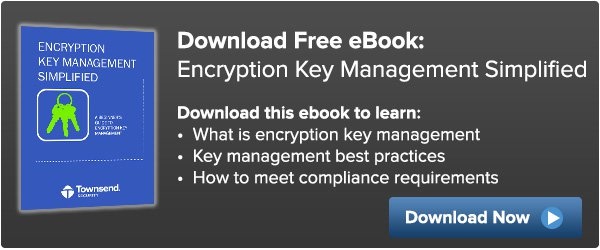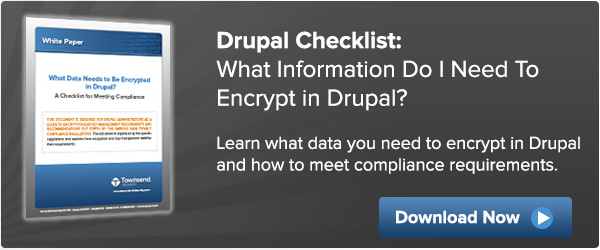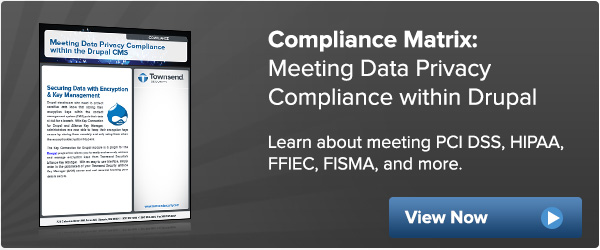Data security in Drupal is a top concern. Townsend Security recently launched our Drupal Developer Program to engage Drupal developers in building stronger, more secure websites, and to give back to the Drupal community by creating a collaborative network of Drupal developers concerned with data security and compliance regulations. Members of the Drupal Developer Program gain free access to Alliance Key Manager, our FIPS 140-2 compliant cloud key manager, as well as NIST-validated AES onboard encryption, for non-production testing and development.
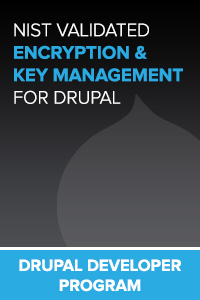 Many Drupal developers today run up against tricky situations when developing websites that collect sensitive data such as payment card information, personally identifiable information (PII), and user passwords--not just commerce information. Developers are asking themselves, “what compliance regulations do I face”, “which data needs to be encrypted”, and “how do I do encryption and key management right to meet compliance?”
Many Drupal developers today run up against tricky situations when developing websites that collect sensitive data such as payment card information, personally identifiable information (PII), and user passwords--not just commerce information. Developers are asking themselves, “what compliance regulations do I face”, “which data needs to be encrypted”, and “how do I do encryption and key management right to meet compliance?”
With Key Connection for Drupal, an API designed to offboard encryption keys to a secure key server, encryption and key management is made easier than ever. Now Drupal developers can join the Drupal Developer Program and learn how to do encryption and key management right.
Here are the top reasons to consider joining the Drupal Developer Program:
1. Encryption and key management is critical to effective data security in Drupal website development.
Today, Drupal is a top CMS for all kinds of websites. Some of these websites, such as commerce, health, and government websites collect sensitive data from users that must be encrypted under compliance regulations such as PCI, HIPAA and FISMA. These compliance regulations also have clear language strongly recommending, if not requiring, encryption and key management.
As Drupal developers take on larger clients, these compliance regulations become a greater concern. Historically, the Encrypt module could be used to encrypt any sensitive data collected; however, there was no adequate means to protect encryption keys. Today, with Key Connection for Drupal, developers can help their clients manage encryption keys away from encrypted data on a secure key server and create websites that effectively protect sensitive data.
2. Learn how to encrypt sensitive data and properly manage encryption keys
In the last year, many of the largest data breaches could have been avoided if proper encryption and key management was implemented. Within the Drupal Developer Program, Drupal developers can learn how to implement encryption and key management into their projects from the ground up. Encrypting and management encryption keys is actually quite easy now in Drupal, and learning how to use these tools will prepare Drupal developers for larger projects that require strong data security.
3. Implement strong data security in your web development projects from the ground up
Adding data security after-the-fact is difficult. Building your websites and applications using strong encryption and key management from the ground up prevents data security projects from turning into a massive headache. The Drupal Developer Program allows developers to test encryption and key management in their projects from the start to avoid a complicated project down the road.
4. Build your knowledge of compliance requirements and help to educate your colleagues
Our Drupal Developer Program is designed to educate developers on encryption and key management best practices as well as any compliance regulations you may face. We continuously offer resources to help you learn what you need to know to meet PCI DSS, HIPAA, GLBA/FFIEC, FISMA, and other compliance regulations, as well as state privacy law requirements.
5. It’s free!
There’s no charge to join our Drupal Developer Program. With free access, we hope to give Drupal Developers the freedom to learn about, test, and implement strong encryption and key management so that you will become a security thought leader in your own organization!

5 Reasons to Join Townsend Security’s Drupal Developer Program
Topics: Encryption, Encryption Key Management, Drupal
Amazon Web Services is a deep and rich cloud platform supporting a wide variety of operating systems, AWS services, and third party applications and services. It is a bewildering array of capabilities with lots of places to store sensitive data. Let’s explore some of the ways that our Alliance Key Manager solution helps AWS customers and partners protect this data. This is a bird’s eye view, and we’ll dive into this in more depth in future blogs:
Amazon AWS Services
 Amazon Relational Database Service (RDS)
Amazon Relational Database Service (RDS)
Alliance Key Manager provides encryption key retrieval and an on-device encryption service to make it easy for your applications to encrypt data in RDS. Townsend Security SDKs can easily be used to provide encryption at the application layer.
Amazon Simple Storage Service (S3)
Alliance Key Manager lets you retrieve 256-bit AES keys in Base64 encoded format ready for use with RDS customer supplied encryption key services. You can easily deploy an AKM dedicated key management service to support encrypting and decrypting files in S3 storage.
Amazon Elastic Block Storage
Amazon Machine Instances (AMIs) provide access to EBS for simple unstructured storage requirements. Townsend Security SDKs can easily be used to provide encryption at the application layer.
Amazon DynamoDB (NoSQL)
The AWS NoSQL implementation does not provide encryption services, but you can easily implement encryption at the application layer using the Townsend Security SDKs. With support for many programming languages you can implement the encryption and key management services you need to meet compliance regulations.
Application Databases:
Microsoft SQL Server
Alliance Key Manager includes a license for Townsend Security’s Key Connection for SQL Server application that supports Transparent Data Encryption (TDE) and Cell Level Encryption for Enterprise edition. This EKM provider installs in your Windows SQL Server environment and enables encryption without any programming. For SQL Server Standard and Web Editions Alliance Key Manager includes a license for the Townsend Security Windows Client for snap-in encryption support.
Oracle Database
Oracle Database encryption support is provided through SDKs that are free of charge with Alliance Key Manager. Java, Perl, PHP, Python, Ruby and C# SDKs and sample code enable rapid deployment of encryption in Oracle environments. Sample PL/SQL code is also available for Oracle Linux platforms.
MySQL, SQLite, PostgreSQL, etc.
Open source database encryption support is provided through SDKs that are free of charge with Alliance Key Manager. Java, Perl, PHP, Python, Ruby and C# SDKs and sample code enable rapid deployment of encryption in these environments.
Software SDKs for Amazon Web Services:
A rich set of application SDKs are available for many programming languages. These SDKs provide support for Java, Microsoft .NET languages (C#, VB.NET, etc.), Perl, Ruby, Python, PHP, and others. These SDKs are provided at no charge to Alliance Key Manager customers.
Application Plugins for Amazon Web Services:
Drupal Encryption and Key Management
Alliance Key Manager integrates naturally with the Drupal web CMS using the Drupal Encrypt module and Townsend Security’s Key Connection for Drupal module available on Drupal.org. Drupal users can retrieve encryption keys for use with local encryption, or use the Alliance Key Manager Encryption Service to encrypt and decrypt data in the key manager with NIST-validated AES encryption.
SQL Server Transparent Data Encryption
Alliance Key Manager integrates directly into the Microsoft SQL Server Enterprise edition database to provide Transparent Data Encryption (TDE) support using the Townsend Security Key Connection for SQL Server application.
SQL Server Cell Level Encryption
Alliance Key Manager integrates directly into the Microsoft SQL Server Enterprise edition database to provide Cell Level Encryption support using the Townsend Security Key Connection for SQL Server application.
Topics: Alliance Key Manager, Encryption, Key Management, Amazon Web Services (AWS)
Overcoming the Top 4 Fears of Encryption and Key Management
Implementing strong data security to protect sensitive data is a top priority for many businesses. Not only does processing and storing sensitive data put you at risk for data loss or breach, it also means that you must meet certain industry regulations and possibly undergo periodic data security audits. Encryption and key management is required if not strongly recommended by many industry regulators such as the Payment Card Industry (PCI) and HIPAA; however, these technologies have a reputation for being difficult, costly, and causing severe impact on server or application performance.
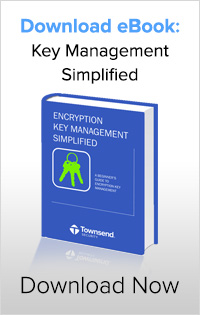 Today this reputation doesn’t holds true, and these common fears can, in fact, get in the way of implementing a strong security solution.
Today this reputation doesn’t holds true, and these common fears can, in fact, get in the way of implementing a strong security solution.
Fear #1 : Encryption & Key Management Will Affect Performance On My System and Applications
One of the most common fears about encryption and encryption key management is that encrypting data will severely impact system performance. It’s true that encryption will have some impact on performance, but if done right, encryption should should never impact your performance more than 2-4%. Performance impacts can also vary based on the amount of data you’re encryption and whether you’re doing whole disk, column and field level, or application level encryption. Because encrypting data at any level is difficult to get right, many organizations who attempt “do-it-yourself” encryption solutions see a much higher performance impact.
Application level encryption is considered the best way to encrypt sensitive data as well as the most difficult. Within an application, an administrator can be selective about which types of data should be encrypted, and which data can be stored in the clear. Therefor the encryption is targeted and only performed on necessary data, which reduces overall performance impact. If done properly, application level encryption will not interfere with your applications.
Fear #2: What if I Lose an Encryption Key?
While the fear of losing a key is legitimate, the keystone of a successful encryption solution is encryption key management, which is the primary solution for managing, storing, and most importantly, protecting encryption keys. Unlike a “key storage” solution, a cryptographic encryption key manager is typically a NIST FIPS 140-2 compliant hardware security module (HSM) or virtual machine in the cloud that manages key storage, creation, deletion, retrieval, rotation, and archival. Many key management solutions are also produced in pairs, with one located in a different geographical location for high availability. If doing encryption key management right, you will never lose an encryption key.
Fear #3: Encryption Key Management Is Too Expensive
Perceived cost is a common barrier for many organizations. However, cutting corners and choosing a third-rate solution is a lot like choosing the cheapest and least reputable car insurance policy: it might get you through the day, but should you ever have an accident, you’ll deeply regret it. Data breaches are no longer a matter of “if,” but “when,” and when a breach happens, it might be the kind that costs you your entire business. Luckily, strong, certified encryption key management solutions are becoming less costly as demand rises and data moves to the cloud. Cost should never be a barrier to good security, and choosing a subscription-based cloud key management solution might be your best way to overcome any cost barriers.
Fear #4: My IT Staff is Too Small
Another common fear is that an organization’s IT department is too small to handle a project like implementing encryption and encryption key management. Encryption key management has a reputation for being incredibly difficult to implement, and many administrators assume that the time and manpower that must be diverted to complete an encryption key management project isn’t worth doing the project at all.
Although this reputation held true ten years ago, encryption key management today has become so simple that in many scenarios can be implemented in less than ten minutes. Of course, ease of implementation always varies depending on your IT infrastructure, platforms, and applications; however, a reputable encryption key management vendor knows that IT departments vary and can work with a variety of platforms in multi-platform environments.
To learn more about encryption key management, download the eBook, Encryption Key Management Simplified.
Topics: Encryption, Encryption Key Management
Critical Steps to Encryption & Key Management in the Azure Cloud [White Paper]
Understanding Options and Responsibilities for Managing Encryption in the Microsoft Azure Cloud
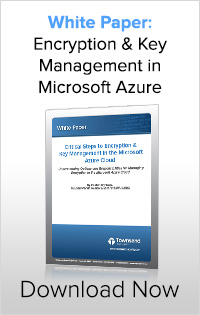 In this latest white paper, authored by Stephen Wynkoop (SQL Server MVP, Founder & Editor at SSWUG.ORG), Stephen will address how “data at rest is data at risk”, specifically looking at the Microsoft Azure Cloud as a selected platform. The author covers a wide array of information, and discusses in detail how critical it is to do the important work of protecting information in a way that works both with your applications and with the compliance regulations & requirements that impact your company and industry.
In this latest white paper, authored by Stephen Wynkoop (SQL Server MVP, Founder & Editor at SSWUG.ORG), Stephen will address how “data at rest is data at risk”, specifically looking at the Microsoft Azure Cloud as a selected platform. The author covers a wide array of information, and discusses in detail how critical it is to do the important work of protecting information in a way that works both with your applications and with the compliance regulations & requirements that impact your company and industry.
Each of the key topic areas below are addressed in detail in the white paper:
Architecture Decisions Drive Technology Approach
The options range from fully-managed data storage and access (Windows Azure SQL Database, WASD) to setting up a SQL Server with a Virtual Machine instance. Each certainly has its place, but there are big differences in options they support.
- Virtual Machines
- Key Decision Points, VMs
- Windows Azure SQL Database (WASD)
- SQL Server and Data Encryption Choices
Impact of Encryption
Encryption, and the impact of encryption on your systems, is a big area of concern for those deploying it. Three different areas are important to consider when impact on systems is considered.
- Performance
- Backup and Restore Operations
- High Availability
Key Management Fundamentals
There are core best practices to consider while you’re deploying your selected solution. Some are procedural while others are software/hardware implementations. Keep in mind that the key is to protect your most important secret: the encryption keys. You must provide for protection of the encryption keys, while still providing for access, updates and rotation (key management) of those encryption keys throughout their lifecycle.
- Segregation of Duties
- Dual Control & Split Knowledge
- Key Rotation
- Protection of Keys
- Access Controls and Audits, Logging
The author also covers how Townsend Security’s Alliance Key Manager provides answers to these challenges of working with the Microsoft Azure Cloud, securing information with encryption, and the critical need to manage the keys. For more information on Alliance Key Manager for Windows Azure, download our solution brief or get started with a complimentary 30-day evaluation
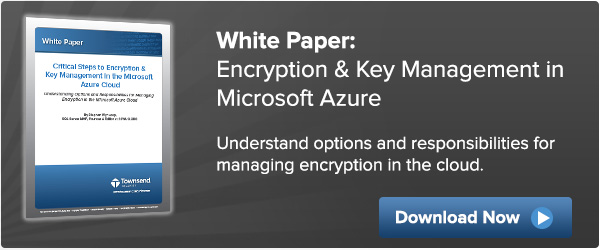
Author Bio: Stephen Wynkoop
Stephen Wynkoop is the founder and editor for SSWUG. ORG – the SQL Server Worldwide User’s Group where he writes a column and maintains the site overall. SSWUG features a weekly video programs about the database and IT world, webcasts, articles, online virtual community events and virtual conferences several times a year. Stephen is a Microsoft SQL Server MVP and the author of more than 10 books, translated into at least 7 languages. Stephen has been working with SQL Server since the very first version, with a prior experience in database platforms that included dBase and Btrieve. Stephen can be contacted at swynk@sswug.org.
Topics: Alliance Key Manager, Encryption, Encryption Key Management, White Paper, SQL Server, Virtualized Encryption Key Management, Cloud Security, Microsoft Windows Azure
"I am collecting data in Drupal. What data do I need to encrypt?"
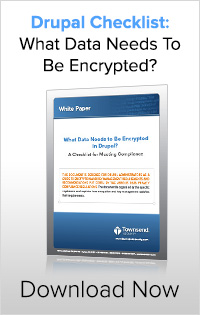 Organizations starting an encryption project always have this question on their minds. It is a simple question, but can be hard to answer. Generally speaking, you should encrypt any information that alone, or when combined with other information, can identify a unique, individual person. This is called Personally Identifying Information, or PII. This should be your starting point, but you may need to address other information depending on the compliance regulations you must meet.
Organizations starting an encryption project always have this question on their minds. It is a simple question, but can be hard to answer. Generally speaking, you should encrypt any information that alone, or when combined with other information, can identify a unique, individual person. This is called Personally Identifying Information, or PII. This should be your starting point, but you may need to address other information depending on the compliance regulations you must meet.
Federal/State Laws and Personally Identifiable Information (PII)
Federal and State laws vary in terms of what they consider Personally Identifiable Information (PII), but there is a lot of commonality between them. PII is any information which either alone or when combined with other information, which can identify an individual person. Examples include email addresses, first name, last name and birth date.
[Download white paper for complete list]
Educational Information Covered by FERPA
Educational institutions who fall under the FERPA regulation must protect PII as well as information like student names, student ID numbers, and family member names.
[Download white paper for complete list]
Federal Agencies and FISMA
Federal Agencies must evaluate their systems for the presence of sensitive data and provide mechanisms to insure the confidentiality, integrity, and availability of the information. Sensitive information is broadly defined, and includes PII, as well as other information classified as sensitive by the Federal agency. Sensitive information might be defined in the following categories: medical, financial, proprietary, contractor sensitive, or security management.[Download white paper for complete list]
Medical Information for Covered Entities and HIPAA/HITECH
The HIPAA/HITECH Act defines Protected Health Information (PHI) to include PII in addition to the following PHI: Patient diagnostic information, payment information, health plan beneficiary numbers, full facial photographs, etc.
[Download white paper for complete list]
Payment Card Data Security Standard (PCI DSS)
The Payment Card Industry Data Security Standards (PCI DSS) require that merchants protect sensitive cardholder information from loss and use good security practices to detect and protect against security breaches. If you accept or process credit card or other payment cards, you must encrypt the Primary Account Number (PAN).
Financial Data for FFIEC
Banks, credit unions, and other financial institutions must protect Non-public Personal Information (NPI) which includes personally identifying financial information. In addition, you should protect income, credit score, etc.
[Download white paper for complete list]
Encrypting Data in Drupal
Townsend Security is helping the Drupal community encrypt sensitive data and properly manage encryption keys. Developers who need to protect sensitive data know that storing their encryption keys within the content management system (CMS) puts their data at risk for a breach. With Key Connection for Drupal and Alliance Key Manager, administrators are now able to keep their encryption keys secure by storing them remotely and only accessing them when the encryption/decryption happens.
The Key Connection for Drupal module is a plugin for the Encrypt project that allows you to easily encrypt sensitive data with NIST-validated AES encryption and securely retrieve and manage encryption keys from Townsend Security’s FIPS 140-2 compliant Alliance Key Manager. With an easy to use interface and certifications to meet compliance requirements, you can rest assured knowing your data is secure.
Topics: Encryption, Higher Education, Drupal
GLBA/FFIEC Compliance = Encryption & Key Management
Compliance regulations and security best practices require the encryption of sensitive financial data and the protection of encryption keys with proper key management.

The financial industry includes banks, credit unions, and other financial organizations, including venture capital firms, private equity firms, investment banks, global investment firms, bank holding companies, mutual funds, exchanges, brokerages, and bank technology service providers, among others. In order to meet compliance regulations, information security programs must be in place to ensure customer information is kept confidential and secure, protected against potential threats or hazards to personal information (cyber-attack, identity theft) and protected against unauthorized access to or use of a customer's personal information. For business owners, database administrators, or developers who need to protect their customers’ sensitive data with encryption; storing the encryption keys within the same database puts that information at risk for a breach.
If you fall within the financial sector, the following will apply:
The Gramm-Leach-Bliley Act (GLBA) - 15 USC 6801 - of 1999 first established a requirement to protect consumer financial information.
TITLE 15 , CHAPTER 94 , SUBCHAPTER I , Sec. 6801. US CODE COLLECTION
Sec. 6801. - Protection of nonpublic personal information
(a) Privacy obligation policy
It is the policy of the Congress that each financial institution has an affirmative and continuing obligation to respect the privacy of its customers and to protect the security and confidentiality of those customers' nonpublic personal information.
(b) Financial institutions safeguards
In furtherance of the policy in subsection (a) of this section, each agency or authority described in section 6805(a) of this title shall establish appropriate standards for the financial institutions subject to their jurisdiction relating to administrative, technical, and physical safeguards.
The Federal Financial Institutions Examination Council (FFIEC) supports the GLBA mission by providing extensive, evolving guidelines for compliance and evaluating financial institutions. Financial services regulations on information security, initiated by the GLBA, require financial institutions in the United States to create an information security program to:
- Ensure the security and confidentiality of customer information
- Protect against any anticipated threats or hazards to the security or integrity of such information
- Protect against unauthorized access to or use of customer information that could result in substantial harm or inconvenience to any customer
Federal Reserve Board Regulations - 12 CFR - CHAPTER II - PART 208 - Appendix D-2
-- Interagency Guidelines Establishing Standards For Safeguarding Customer Information--
… III. Development and Implementation of Information Security Program
… C. Manage and Control Risk
Each bank shall:
… c. Encryption of electronic customer information, including while in transit or in storage on networks or systems to which unauthorized individuals may have access.
Enforcement of these financial industry compliance guidelines fall to five agencies: the Federal Reserve System (FRB), the Federal Deposit Insurance Corporation (FDIC), the National Credit Union Administration (NCUA), the Office of the Comptroller of the Currency (OCC), and the Office of Thrift Supervision (OTS). In collaboration, these agencies have developed a series of handbooks that provide guidance, address significant technology changes and incorporate a risk-based approach for IT practices in the financial industry. The "Information Security Booklet" is one of several that comprise the FFIEC Information Technology Examination Handbooks, and references encryption in detail.
Summary: Financial institutions should employ encryption to mitigate the risk of disclosure or alteration of sensitive information in storage and transit. Encryption implementations should include:
- Encryption strength sufficient to protect the information from disclosure until such time as disclosure poses no material risk
- Effective key management practices
- Robust reliability
- Appropriate protection of the encrypted communications endpoints
To meet the growing need for NIST validated and FIPS 140-2 compliant encryption and key management, the data security experts at Townsend Security provide a certified key management system (Alliance Key Manager) which provides secure key storage and retrieval options for a variety of Enterprise and open source platforms. Now when nonpublic personal and financial information is collected or stored in a database it can easily be encrypted and the encryption keys properly managed.
To learn more, download the ebook: Encryption Key Management Simplified
Additional Resources:
Federal Financial Institutions Examination Council (FFIEC)
FFIEC Information Technology Examination Handbooks
Federal Deposit Insurance Corporation (FDIC)
National Credit Union Administration (NCUA)
Topics: Compliance, Data Security, Encryption, eBook, Encryption Key Management, GLBA/FFIEC
PCI DSS Compliance = Encryption & Key Management
Many compliance regulations and security best practices require the encryption of sensitive data and the protection of encryption keys with proper key management.
Security best practices and PCI DSS compliance regulations call for sensitive data to be protected with encryption and that data-encrypting keys (DEK) be physically or logically separated from the sensitive data and protected with strong key-encrypting keys (KEK). Anyone who needs to protect sensitive data in their database, needs to know that storing the encryption keys within the same location puts data at risk for a breach. Depending on what type of information is being stored and what industry guidance your project/company falls under, compliance regulations in addition to PCI DSS may apply.

For any company that accepts credit card payments, the Payment Card Industry Data Security Standards (PCI DSS) issues 12 requirements that must be met in order to be compliant. It can seem overwhelming at first, but the PCI council that issues PCI DSS also provides detailed reference guides and instructions on each requirement.
Let’s take a brief look at all twelve items:
Build and Maintain a Secure Network and Systems
Requirement 1: Install and maintain a firewall configuration to protect cardholder data
Requirement 2: Do Not use vendor-supplied defaults for system passwords and other security parameters
Protect Cardholder Data
Requirement 3: Protect stored cardholder data*
Requirement 4: Encrypt transmission of cardholder data across open, public networks
Maintain a Vulnerability Management Program
Requirement 5: Protect all systems against malware and regularly update anti-virus software or programs
Requirement 6: Develop and maintain secure systems and applications
Implement Strong Access Control Measures
Requirement 7: Restrict access to cardholder data by business need-to-know
Requirement 8: Identify and authenticate access to system components
Requirement 9: Restrict physical access to cardholder data
Regularly Monitor and Test Networks
Requirement 10: Track and monitor all access to network resources and cardholder data
Requirement 11: Regularly test security systems and processes
Maintain an Information Security Policy
Requirement 12: Maintain a policy that address information security for all personnel
Within the latest documentation by the PCI Security Standards Council (v3.0 released November 2013) specific testing procedures and guidance is given for Requirement 3 on pages 34-43. The PCI Security Standards Council (PCI SSC) website (http://www.pcisecuritystandards.org) contains this documentation along with a number of additional resources to assist organizations with their PCI DSS assessments and validations.
* Requirement 3 addresses the need for encryption and key management, stating:
“Protection methods such as encryption, truncation, masking, and hashing are critical components of cardholder data protection. If an intruder circumvents other security controls and gains access to encrypted data, without the proper cryptographic keys, the data is unreadable and unusable to that person. Other effective methods of protecting stored data should also be considered as potential risk mitigation opportunities. For example, methods for minimizing risk include not storing cardholder data unless absolutely necessary, truncating cardholder data if full PAN is not needed, and not sending unprotected PANs using end-user messaging technologies, such as e-mail and instant messaging.”
The PCI Security Standards Council also issues their Cloud Computing Guidelines (https://www.pcisecuritystandards.org/pdfs/PCI_DSS_v2_Cloud_Guidelines.pdf) and additional information around virtualization of data protection solutions so you can be PCI compliant with a cloud-based solution for encryption and key management.
Other compliance requirements for protecting information go beyond cardholder data (PCI focuses on PAN or the Primary Account Number specifically) and also require that personally identifiable information (PII) such as names, birthdates, email address, zip codes, usernames, or passwords be protected properly with encryption and key management. To meet the growing need for NIST validated and FIPS 140-2 compliant solutions, the data security experts at Townsend Security provide a certified key management system (Alliance Key Manager) which provides secure key storage and retrieval options for a variety of Enterprise and open source platforms. Now sensitive information can easily be encrypted and the encryption keys properly managed.
For more information on encryption, download the latest eBook, The Encryption Guide:
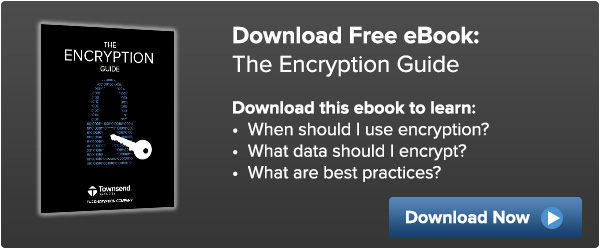
Topics: Compliance, Encryption, eBook, PCI DSS, Encryption Key Management
Data Security: 10 Things to Consider When Moving to the Cloud
Encryption and Key Management Can Provide Data Security in the Cloud

Data security is frequently brought up as one of the biggest concerns of moving to the cloud. According to a recent American Institute of CPA’s survey, weighing in at over 63%, the top barrier to adopting or expanding cloud solutions are security concerns. Whether you are looking for a cloud database solution, or moving other sensitive business data to the cloud, choosing your cloud provider will be a critical decision. After all, not all cloud security providers or cloud security solutions are created equal.
If you’re thinking of moving some or all of your sensitive data to the cloud, we’ve compiled a handy list of questions to help you select the right security solutions for your business. Remember every provider is different, so what might be right for one company might not be the best solution for another. It can seem like a daunting process, but as long as you do your research then you’ll be on the right track!
-
If I have my sensitive data stored in the cloud, am I responsible if my cloud provider has a data breach?
The short answer is yes you are.
When you have sensitive data and are moving it into a cloud environment you are still ultimately responsible for protecting that data. This can be confusing because cloud vendors make a lot of statements about encryption and compliance, however you are responsible for your overall data protection strategy. Data security is a shared responsibility in the sense that it is the cloud providers network, datacenter, and hardware and you bring the applications, operating system, and data. You are fully responsible for that data. You are also responsible for making sure the cloud provider can back up their security claims by requiring to see specific written compliance reports such as a SOC 3 audit statement, annual security assessment, and a letter of attestation by a QSA auditor. -
Which compliance regulations apply to my business?
In addition to the 4 listed below, there are also many state laws and regulations that govern security best practices. It is your responsibility to know which ones apply to your company (and which ones apply to your cloud provider location).
PCI Data Security Standard (PCI DSS) applies to anyone, public or private, who take credit cards for payment. Primary account numbers (PAN) are specifically addressed.
HIPAA/HITECH Act requires the medical segment (and any business associate) provide data protection for protected health information (PHI) of patients.
GLBA/FFIEC applies to the financial industry (bank, credit union, trading organization, credit reporting agency) for protecting all sensitive consumer information.
Sarbanes-Oxley (SOX) applies to public traded companies for sensitive data of personally identifiable information (PII).
In addition to these compliance regulations, the Cloud Security Alliance (CSA) has created the Cloud Controls Matrix (CCM) specifically designed to provide fundamental security principles to guide cloud vendors and to assist prospective cloud customers in assessing the overall security risk of a cloud provider. -
What type of data will be stored in the cloud, and does it need to be encrypted?
If you are storing any sensitive data (PAN, PII, or PHI) that information must be protected and will need to be encrypted both at-rest and in-transit. Sometimes your whole database must be encrypted, other times you can select to encrypt at the column level. Make sure options are available to cover all your critical information. -
Who will have access to the encrypted data? Will my cloud service provider or other cloud tenants be able to access to my information?
Only you should have access to your encrypted data and the encryption keys that protect it. In a multi-tenant environment like the cloud, it is even more important to control access. Depending on the value of the data that you store, and your risk tolerance, you may opt to use a virtual private cloud vs. a multi-tenancy cloud environment to store your most sensitive information. -
Where should I store and manage my encryption keys?
Always use an external Key Manager solution to create, store, manage, and properly rotate your encryption keys. Storing encryption keys in the same database as the encrypted data has always been something to avoid! Moving your data to the cloud still allows you to choose where you store your encryption keys. Hardware Security Module (HSM), Cloud HSM, virtual appliance (VMware), private cloud instance… just as long as they are stored and managed away from the data they protect! - How much control do I retain over my encryption keys?
With using an external encryption key management solution, you should retain complete control over your encryption keys.
These next few questions are encryption & key management solution specific. So if you are comparing solutions be sure to ask each vendor!
-
Do Townsend Security solutions protect data at-rest or in-transit? What type of encryption is used?
Yes. We use industry standard AES Encryption to protect data-at-rest. We also use 128-bit SSL encryption to protect data-in-transit. -
Can Townsend Security solutions grow to meet my business needs? How scalable are the solutions, is there a limit to how many applications I can (connect)?
Yes. We believe you should get a flexible solution that will be able to scale up as your business grows, and not have a limit on how many application connect to it!
-
Are Townsend Security solutions validated by the National Institute of Standards and Technology (NIST)?
Yes. Our solutions are NIST validated and also FIPS 140-2 compliant. -
Does Townsend Security Have a “Test Drive” Offering?
Yes. We always offer a complimentary 30 day evaluation of all of our solutions. Providing a free trial allows you to fully test the concept first, which can help allay fears and and answer any questions before making a commitment. With cloud deployments, you may still need to pay for their implementation services associated with the evaluation period, but in the new world of cloud computing, it is important to look for proof points and results before you make your investment.
Data stored in the cloud can be as secure or accessible as you make it. It is up to each and every cloud user to assess their business risk and uphold an expected standard of security.
It is ultimately your responsibility to make sure your data security plan meets compliance regulations. Make sure you have a strong defense in depth strategy in place and are using industry standard encryption and proper key management to protect your data wherever it resides. Learn more by downloading our Resource Kit on Key Management in the Cloud:
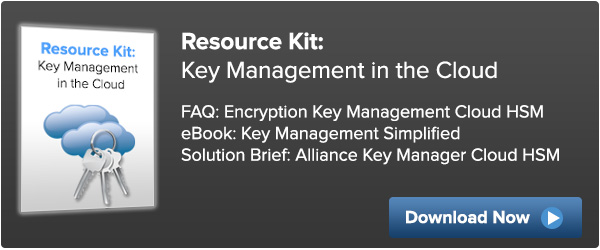
Topics: Alliance Key Manager, Data Security, Encryption, Encryption Key Management, Defense-in-Depth, Resource Kit, Cloud Security
3 Ways Encryption & Key Management Can Help You Sleep
Turn Your Nightmares into a Peaceful Night’s Sleep... Even When Your Sensitive Data is Stored in the Cloud

Compliance regulations and security best practices can be enough to make most developers lose some sleep at night, but when the subjects of encryption & key management in the cloud are brought up… it seems like many of those restless heads start to twitch with other worries as well. It goes beyond what types of data need to be encrypted… to concerns about choosing the right encryption algorithm and properly managing the encryption keys. One of the most reported concerns about encryption is the fear of losing the encryption keys. If keys are lost, the data remains forever shrouded from view… not only for hackers, but for the you too! Here are three important encryption & key management topics, and three excellent resources that will help you rest easy!
#1 Understand the Importance of Encryption and Key Management
Encrypting your sensitive data is critical to meeting compliance regulations and protecting your organization (and your customers) in the event of a data breach. If you are looking for a non-technical overview, then I highly recommend our most recent eBook, “The Encryption Guide” which covers the importance of encryption as well as critical implementation information such as:
- When to use encryption
- What data you should encrypt
- Where you should encrypt that data
- Encryption best practices
(and an excellent summary of compliance regulations) - The importance of encryption key management
In order to have a successful encryption solution you must deploy industry standard encryption methodologies, proper encryption key management (NIST validated solutions), and follow administrative and technological best practices such as dual control and separation of duties.
#2 Learn How to Never Lose an Encryption Key
Industry expert, Patrick Townsend addresses the following four topics in greater depth in his blog article “Never Lose an Encryption Key in Windows Azure” and I hope you will check out what he has to say regarding how Alliance Key Manager running in Windows Azure protects you from this potential problem.
- Backup / Restore
The first line of defense is always to have a backup of your encryption keys and key access policies. Alliance Key Manager provides you with an option to securely back up your encryption keys, security policies, and server settings and to move this backup out of Windows Azure to your own secure storage... - Key and Policy Mirroring
Alliance Key Manager supports Active-Active (real-time key and security policy) mirroring so that you will always have a full set of your encryption keys available to you even after a failover... - Windows Azure Availability Sets
This is a feature that helps you avoid unplanned outages due to failures of the cloud infrastructure or planned maintenance activities, providing one more way to get the best reliability for your key management infrastructure in the Windows Azure cloud... - Mirroring Outside the Windows Azure Cloud
Lastly, if you are still worried about losing your encryption keys, you can always mirror the keys to a key manager located outside the Windows Azure cloud. We have hardware, hosted, and cloud options for you to choose from!
#3 Know Your Compliance Regulations
Our website is a wealth of information on how encryption and key management meet compliance regulations, and it is frequently a topic in our blog articles! Storing sensitive data in a multi-tenant environment comes with an additional set of concerns, so we suggest this Cloud Security Alliance (CSA) white paper Security Guidance for Critical Areas of Focus in Cloud Computing, v3 that focuses on the CSA guidance - Domain 11 - recommendations for encryption key management. Hardware and software redundancy insure that you will never lose encryption services or encryption keys. Reliability and redundancy is provided through:
- Dual RAID controlled disk drives and dual power supplies
- Real time, bi-directional key mirroring
- On demand and scheduled backups
- High availability hot failover
- Load balancing support
In the ever-changing, ever-evolving technical world that we live in, knowledge is power! Our goal is to constantly provide updated, educational content and the best solutions for protecting sensitive data with solid encryption & key management. So while you might be losing sleep over your plans for the summer, but you shouldn’t lose sleep over your encryption strategy!
Start sleeping better by downloading the Encryption Guide:
Topics: Data Security, Encryption, eBook, Encryption Key Management, White Paper
Securing data with encryption and protecting the encryption keys with proper key management is enforced by many compliance regulations (and recommended as a security best practice).
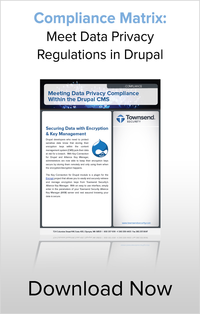 When working with private schools, colleges, and universities, Drupal developers who need to protect their customers’ sensitive data with encryption know important compliance elements include the following:
When working with private schools, colleges, and universities, Drupal developers who need to protect their customers’ sensitive data with encryption know important compliance elements include the following:
- Awareness of how records are managed by the institution.
… (Do you know who will have access?) - Awareness of relevant regulations/laws.
… (Do you know what they need to follow?) - Approach to complying with each item.
… (Do you know what they should do to follow the law?) - Management of institutional records.
… (Do you know what they need to keep and for how long?)
It is important to remember when developing a higher education framework, the ultimate core of higher education is information. Each institution gathers, stores, analyzes, retrieves, and secures the information necessary for proper functioning. Without continued and uninterrupted access to that information, as well as assurances that the information is secure and reliable, they would be unable to fulfill their educational, research, and service missions.
For entities in the education sector, it is important to note that data security and IT solutions for colleges and universities also fall under some of the more familiar compliance regulations due to the various programs offered by each institution:
- PCI DSS will come into play with accepting payments from tuition, books, food services, and housing
- GLBA/FFIEC covers the student loan and financial offices at most institutions
- HIPAA/HITECH is also important to consider as most higher education institutions have their own health centers
Driven by student privacy concerns and the need to comply with regulations such as the Family Educational Rights and Privacy Act, educational institutions must also make sure to secure sensitive data and protect their networks from data loss even when that information must be shared.
Family Educational Rights and Privacy Act (FERPA)
Statute: 20 U.S.C. § 1232g Regulations: 34 CFR Part 99
The Family Educational Rights and Privacy Act (FERPA) is a federal law that affords parents the right to have access to their children’s education records, the right to seek to have the records amended, and the right to consent to the disclosure of personally identifiable information from education records, except as provided by law. When a student turns 18 years old, or enters a postsecondary institution at any age, the rights under FERPA transfer from the parents to the student (“eligible student”).
The Higher Education Information Security Council (HEISC), actively develops and promotes awareness and understanding, effective practices and policies, and solutions for the protection of critical IT assets and infrastructures. HEISC also produces the Information Security Guide: Effective Practices and Solutions for Higher Education, an excellent resource for anyone involved in securing student information with encryption.
Drupal adoption in higher education has skyrocketed with over 71 of the top 100 US Universities and educators around the world publishing websites in Drupal. Arizona State University alone hosts over 800+ websites built in Drupal CMS! To meet the growing need for NIST validated and FIPS 140-2 compliant encryption and key management, the data security experts at Townsend Security partnered with Chris Teizel, CEO of Cellar Door Media and Drupal developer to create the Key Connection plug-in for the Drupal Encrypt module. Key Connection for Drupal provides a secure key management system (Alliance Key Manager) outside of the Drupal installation in order to provide secure key storage and retrieval options. Now when personally identifiable information (PII) is collected or stored in a database it can easily be encrypted and the encryption keys properly managed. Key Connection for Drupal allows developers and users to choose whether they retrieve a key and encrypt/decrypt locally or to send the data to Alliance Key Manager to perform on board encryption.
For more information, download the Drupal Compliance Matrix:
Topics: Alliance Key Manager, Encryption, Higher Education, Key Connection for Drupal, Encryption Key Management, Drupal


